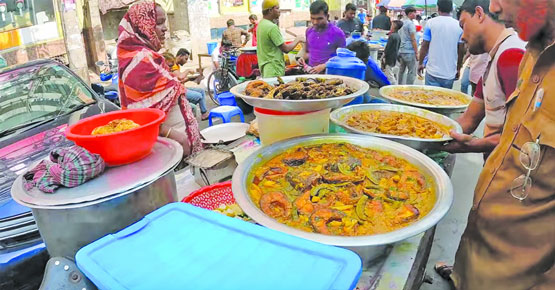Prices at roadside eateries becoming too expensive
Staff Correspondent: As the prices of almost all essentials have gone up, foods served at roadside eateries are no longer cheap, which makes it challenging for daily wage earners and low-income people to have a proper meal.
Mohammad Hanif, 45, has worked as a day labourer in Dhaka for about 13 years. He talked to this correspondent when he recently came for lunch at a roadside shop in the Beribadh area of Mohammadpur.
“Sometimes I eat rice here with vegetables, sometimes with lentil soup. I can no longer eat fish or meat. The prices of food have gone up. With my meagre income, it is not possible for me to now cover grocery expenses, nor can I eat here properly,” he told Dhaka Tribune.
Hanif’s wife and children also used to live with him in Dhaka. Unable to afford their stay in the capital, he sent them back to their village home in Barisal.
“I used to have three meals a day at hotels before, but now I can only bear the expense of two – I need to skip one meal and just have singara or puri.
“It cost me Tk30-35 for a meal previously. Now this cost has soared to Tk70-80. The situation is such that I do not have enough money for food, let alone send anything back home to my wife.”
A rickshaw puller, Md Zikirullah, who was having tea with bread at a roadside tea stall in front of Shimanto Square in Dhanmondi one afternoon, said the price of a loaf of bread was Tk10, and now it is Tk15, while a cup of tea used to cost Tk5, and now the price has become Tk8.
“I do not have any of the money I earn by pulling a rickshaw all day left after eating at eateris. That is why I now eat bread with tea.”
“I came out with my rickshaw at 9am. It is now almost 12:30pm, and I have only earned Tk60 thus far. There are fewer rickshaw passengers now than before. Earlier, I needed to deposit Tk100 to the [rickshaw] owner and now it has been increased to Tk150. Our income has not increased, but the number of passengers has dropped, while the living cost has gone up.”
Eatery owners also in distress
Md Jamal owns the eatery where Hanif was eating. He said it has become difficult to keep his shop open due to a lack of customers.
Jamal told Dhaka Tribune: “I have been doing this business for five years but have never experienced such a situation before. The situation is totally different now. When I go to the market, I cannot buy the things I want.”
“It is not possible to take even Tk2 extra from those who eat here. It has become impossible to make a profit from this hotel. It is difficult even to have Tk100 in my pockets at the end of the day.”
When asked which foods are in high demand, Jamal replied: “Most customers eat alu bhorta and rice for breakfast for Tk20 – each item costs Tk10. For lunch, there is rice, fish and chicken. The price of this meal is Tk60. There are also tilapia, pangash fish and eggs.”
Sahera Khatun sells food on the footpath in front of Anam Rangs Plaza on Dhanmondi’s Satmasjid Road.
Five rickshaw pullers were eating rice at her shop. Having worked hard all day, they were having only vegetables and lentil soup.
When asked whether her eatery’s food prices have increased or not, Sahera told Dhaka Tribune: “The prices of all items have increased excessively. But we cannot increase the prices of our food. If we did that, our customers would not eat here anymore.”
Working people eat and drink at sidewalk shops in different areas of the capital, most of them being rickshaw pullers. Other customers include daily labourers and deliverymen.
Broiler chicken curry now costs Tk60 at these hotels too, which used to be Tk35-Tk40.
Pangash, tilapia and koi fish cost Tk30-35 apiece, which now ranges from Tk50-60.
Earlier, a bowl of lentil soup was Tk5, which has now doubled. Vegetables priced at Tk15 earlier are now Tk25.
Golam Rahman, president of Consumers Association of Bangladesh, told Dhaka Tribune: “When the prices of daily necessities increase, the cost of living also increases. It is normal.”
“When there is inflation in the country, it is very natural that prices at roadside stalls will increase. And when inflation occurs, there is a tendency among everyone to raise prices. That trend is also present in these small shops,” he added.
President Joe Biden tests positive for COVID-19 while campaigning in Las Vegas, has ‘mild symptoms’
International Desk: President Joe Biden tested positive for COVID-19 while traveling Wedne…








